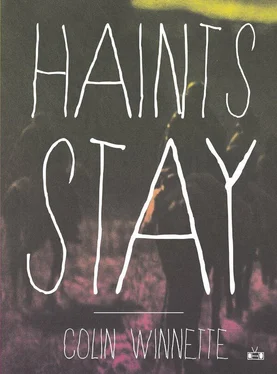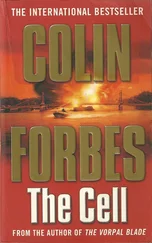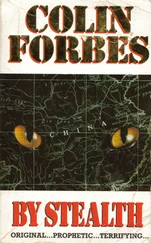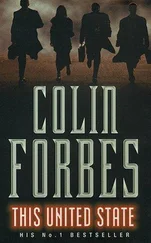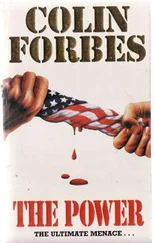“Who are you?” said the man.
He held his daughter behind him then.
“What do you want?”
Bird had the pistol trained on him. He was trembling.
“Are you hurt?” said the man.
Bird did not respond.
The cat bounded beneath the porch. The girl’s head appeared to the right of her father’s hip.
“He’s lost an arm,” she said.
“Are you hurt?” the man said again.
“No,” said Bird. “Where is the nearest town?”
“About ten miles up that road,” said the man, pointing to a path leading from the front of the house. “Are you here to hurt or rob us?”
“No,” said Bird. “But we’d like to eat.”
“We?”
“My wife and I,” said Bird.
“But you can’t be more than… fourteen?” said the man.
“I am older than that,” said Bird. “We’ve been walking for days.”
“From where?”
“The woods,” said Bird, “that way.” He signaled with the barrel of the pistol then directed it back at the man.
“Wolf Creek? But it’s winter…”
Bird did not respond.
“You were in the valley when it snowed?”
Bird nodded.
“With your parents?”
Bird did not respond.
“Alone then.”
“I want to meet his wife,” said the man’s daughter. She was all the way out at his side now, gripping his hand as he held it to her.
“She’s with the ponies,” said Bird.
“I don’t want her fooling with those ponies,” said the man. “I aim to sell them.”
“She just wanted to meet them,” said Bird.
“I don’t want her fooling with them. If you go get her, and put that pistol away, we’ll give you some supper and I can hitch you into town in the morning.”
“Where will we sleep?”
“We’ve got furs and a floor,” said the man.
“I’d just as soon sleep out here,” said Bird.
“In the mud?”
Bird nodded.
“Fine by me,” said the man. “Now go get your wife and tell her not to fool with those ponies.”
Brooke made himself useful. He answered to Wendell, but more than that, he aided Marston and Clay when he was done with any particular assigned task. He dug the fire pits — they often had two or three going a night. He dug latrines and led the more troublesome horses. He offered rest to the weary. He offered bits of the food he caught, a bite of rabbit to the youngest girl after he and his wife were fed. He fell in line with their party, and they absorbed him. His wife was slowly recovering. Some mornings, she rose and walked with him. Other days, she spent alone in the shade and relative comfort of the wagon.
Soon, they came upon the large rocks Brooke had not forgotten. Jack spotted the wreckage, and he, Marston, and Clay rode out to investigate it. The others rested. The boys reported that it was a hired stagecoach, containing several corpses. There had likely been a robbery. There were no tracks, and the corpses were far gone. Whoever had taken down the stagecoach had emptied it of whatever contents were of value and were now gone from the area. It was likely that the wagon train was safe from harm, and that they should continue as they had been.
“Did you investigate the rocks?” said Wendell. “Did you check for caves?”
“We found two caves,” said Marston. “They were empty. There was yellow water in one and we filled the reserve canteens.”
“You shouldn’t drink yellow water,” said Wendell.
“We’ve marked them for emergencies only,” said Marston.
They set on again.
That night, Brooke boiled the yellow water and strained it through several layers of fabric and sand. It cleared slightly. The smell lifted. He drank a small amount in front of Wendell to show that it was trustworthy. The party waited one day, kept an eye on Brooke, who showed no signs of suffering or discontent. By the end of the day, they were sipping from the reserve canteens. Wendell sent Marston back to the cave to fill anything that could be capped. There was no telling when they would encounter water again. They had left the creek some days before, and now the only water was that which gathered in muddy puddles along their path, and sprang from the occasional hoof print. Brooke volunteered to ride with Marston.
They took the two fastest horses. It was not far at all to back-track without the wagons and the slow pace of their train. As they reached the stagecoach, Marston did not pause, but Brooke slowed his ride.
“What do you think they were transporting?” said Brooke.
“Gold,” said Marston. “Or someone influential. Perhaps a gang leader or a prisoner or a political figure. The men were armed. They wore holsters and pouches. Whatever it was is gone, though. The cave’s to the left. In that larger of the two red rocks.” He gestured with the reins of his horse in the direction he was headed.
Brooke dismounted and examined the stagecoach. It was nearly unrecognizable with all the weather had done.
“Must have been gold,” Brooke yelled to Marston. “The back seat is a hollowed bench, emptied.”
Marston was just beyond earshot. He signaled for Brooke to join him, so Brooke mounted his horse and rode to meet the man.
“The back seat is a hollow bench,” said Brooke.
“So it was gold,” said Marston.
“Looks like,” said Brooke.
“Imagine,” said Marston, “even if it were still all there to be collected, Wendell would not allow us to take it.”
“Why’s that?”
“Too heavy. An unnecessary burden. We would be sore to leave it but he would figure it the same as if we had never found it.”
“And you all listen to him?”
“Always have,” said Marston.
“And he brought you out here?”
“It was a group decision. It is this one,” said Marston. They entered the cave, filled all they had to fill, and climbed back upon their horses.
“But it was his idea?” said Brooke.
“Wendell has fond memories of Wolf Creek,” said Marston. They rode at a good clip for some time then, slowed when they spotted the wagon train in the distance.
“And what did you think?” said Brooke.
“That it would not be as he remembered it,” said Marston. “But we were out of money and nothing would grow, so we needed a new plan.”
“You sold your land and headed out.”
Marston nodded. “Bought the wagons and what else we could with the money.”
“What is Wolf Creek?”
“A town in a valley. Small, fertile, lonesome. I’ve only heard stories. Snows come in every so often and wreak all kinds of havoc. The valley’ll fill up in the worst of them. Heard a family died one winter, holding out for the snow to pass. Most people use it as a place to stop off in between.”
“In between what?”
“Where they’re coming from and where they’re going,” said Marston. “There’s water there. And cheap land. We don’t have to stay forever.”
“How long have you been moving?”
“A long time,” said Marston.
They were quiet then. They joined the train shortly after and separated.
The woman Brooke met in the snow was up and walking alongside Irene.
“John has come back,” said Irene.
The woman looked at him, confused for a moment, and then smiled.
Brooke lowered himself from his horse and loaded the water into the back of the wagon. That evening, he treated the water and sat with the woman he met in the snow. She watched him and learned the routine, then set to treating some of the water herself.
“It doesn’t get rid of everything,” said Brooke, “but it tastes a little better and the smell goes away.”
“Is it still dangerous?”
“Not really,” said Brooke. “It might come out your far end a little aggressively, but you’ll recover and it won’t happen again. Your stomach gets stronger like an arm.” He flexed.
Читать дальше
